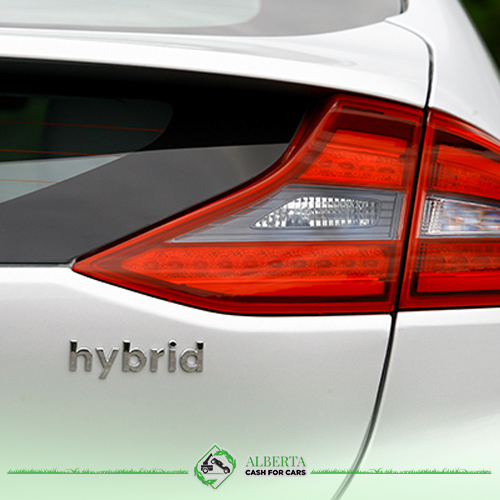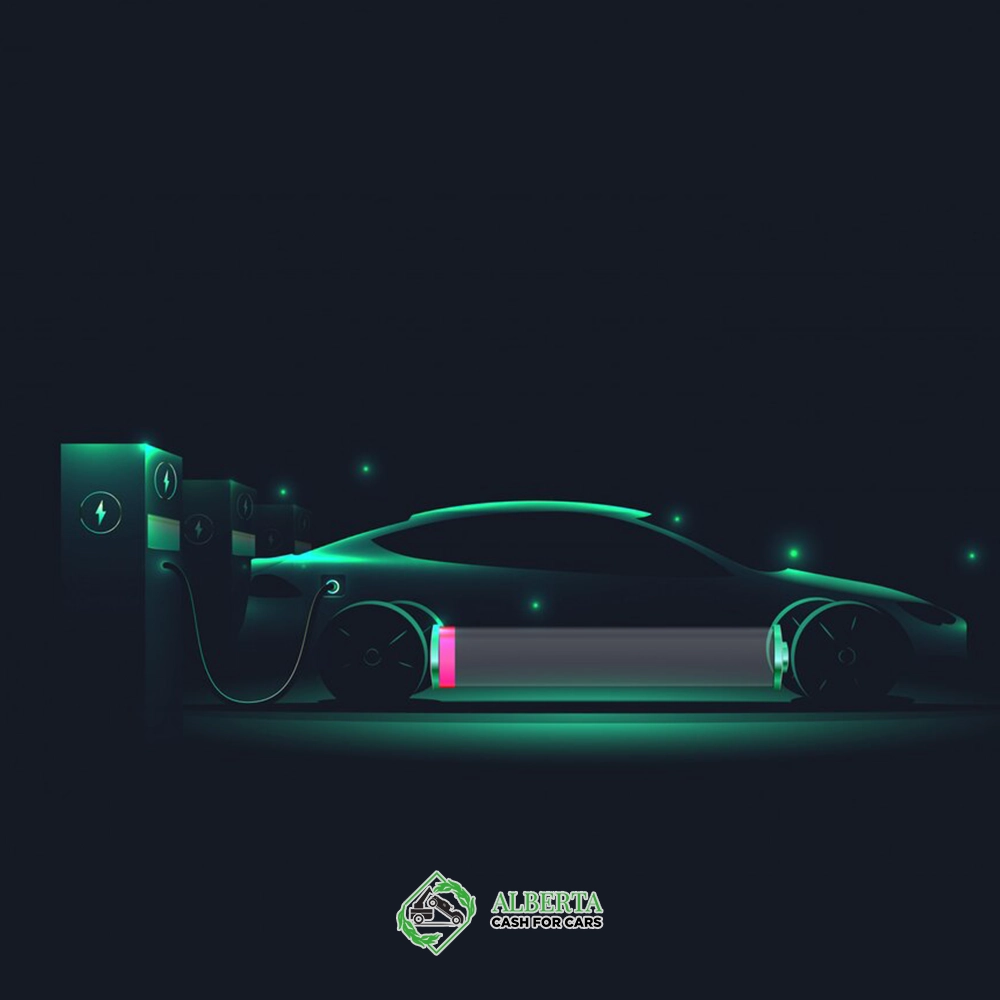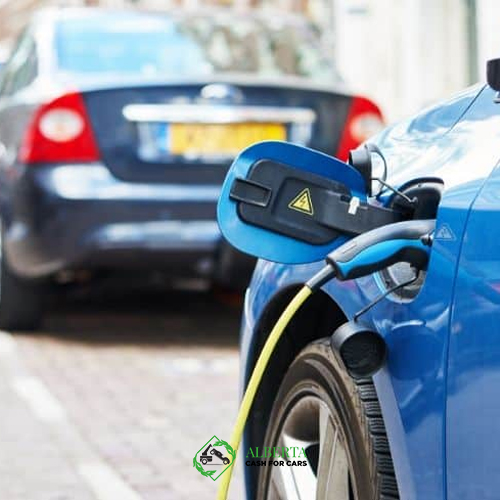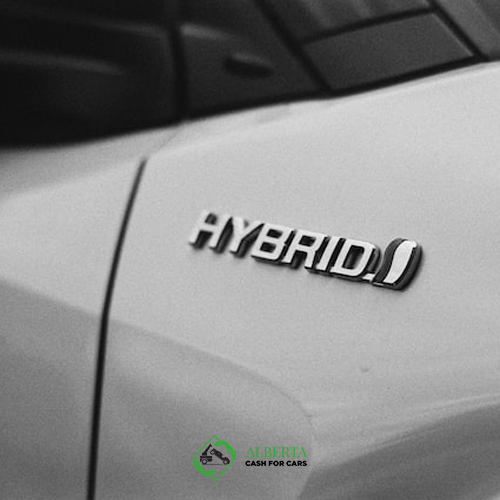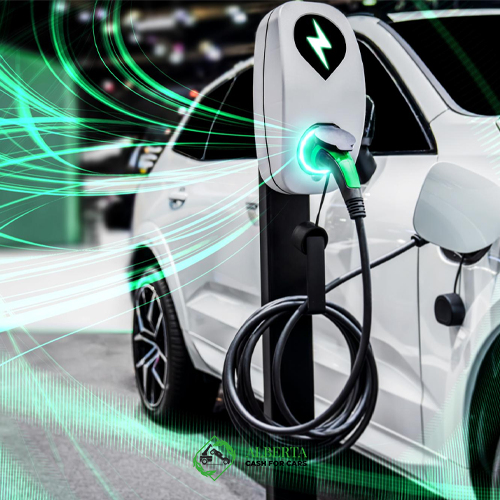Recently, hybrid vehicles have become very popular as a green and economical replacement for conventional gasoline-powered vehicles. Hybrid vehicles, which combine an internal combustion engine with an electric motor and battery, have a number of benefits that make them a desirable option for environmentally aware drivers. Hybrid vehicles do have some disadvantages, though, just like any other technology. In order to assist you make an informed choice, Cash 4 Cars Calgary will examine both the Pros and Cons of Hybrid Cars in this blog post.
What is a Hybrid Car and How Do They Work?
A hybrid car, generally known as a hybrid electric vehicle (HEV), is a vehicle that uses two sources of power to propel itself. These sources are an internal combustion engine, generally fueled by gasoline and an electric motor powered by a battery pack. By combining these two power sources, hybrid cars aim to achieve better fuel efficiency and lower emissions than conventional gasoline-powered vehicles.
Hybrid cars use several mechanisms to optimize fuel consumption and power use. During downshift or braking, the electric motor changes to generator mode, transforming the car’s kinetic power into electrical energy. This energy is then stowed in the battery pack for later use. When extra power is required, such as during acceleration, the electric motor helps the internal blast engine, decreasing engine load and enhancing fuel efficiency. In specific conditions, the electric motor can operate independently to power the vehicle at low speeds or in stop-and-go traffic, reducing fuel consumption and emissions.
Pros of Hybrid Cars
Here are some of the most significant pros that hybrid cars provide:
Fuel Efficiency
One of the key advantages of hybrid cars is their remarkable fuel efficiency. By utilizing both gasoline and electric power, hybrid cars can significantly reduce fuel consumption compared to conventional vehicles. The electric motor assists the gasoline engine during acceleration and at low speeds, thereby minimizing fuel usage and lowering carbon emissions.
Environmental Friendliness
Using gasoline cars has many negative environmental effects, for example, these cars release carbon dioxide and other greenhouse gases directly from their exhaust pipes. Over time, this issue can have a great impact on the environment. According to reports that are related to pros and cons of hybrid cars on the environment topic, a typical passenger vehicle emits about 4.5 tons of carbon dioxide annually, as well as other pollutants such as methane and nitrogen oxides and all greenhouse gases contribute to global warming. Even before the gasoline reaches your engine, extracting the fuel for use as energy comes at a huge environmental cost.
With hybrid vehicles, you have two fuel options: gasoline and electricity. If you choose gasoline, you will still emit greenhouse gases from your exhaust pipe, but this amount is less than gasoline car models because their fuel consumption is higher.
However, if you buy a hybrid car, you will most likely use electricity to start your car. By doing this you will have no direct emissions from the exhaust. Your commuting with this car will be environmentally friendly, of course, depending on where your electricity is supplied from, while each year more electricity is supplied from renewable energies, fossil fuels still consume more electricity. They produce the world.
Regenerative Braking
Hybrid cars employ regenerative braking technology, which allows the electric motor to act as a generator and convert kinetic energy into electricity during deceleration and braking. This captured energy is then stored in the battery and utilized later, reducing energy wastage and improving overall efficiency.
Lower Operating Costs
Hybrid cars offer long-term cost savings due to their improved fuel economy. Although hybrid vehicles typically have a higher upfront cost than their gasoline counterparts, the savings from reduced fuel consumption can offset this initial investment over time. Additionally, some governments and organizations offer incentives, tax credits, and subsidies for purchasing hybrid cars, reducing costs.
Enhanced Resale Value
As hybrid cars continue to gain popularity and environmental concerns grow, their resale value remains relatively high. The market demand for pre-owned hybrid cars is strong, allowing owners to recoup a significant portion of their initial investment when selling or trading in their vehicle.
Silent Operation
When running on electric power alone, hybrid cars produce minimal noise. This silent operation enhances the driving experience, reduces noise pollution, and contributes to a quieter environment, especially in urban areas.
Government Incentives
Many governments and local authorities offer incentives to encourage the adoption of hybrid cars. These incentives may include tax credits, rebates, reduced registration fees, or access to carpool lanes, allowing you to enjoy additional savings and perks.
Save money by buying a hybrid car
By purchasing a hybrid vehicle, thanks to efficient engines and the option to switch to electricity for fuel, you can avoid going to the gas station and paying high fees to fill up your tank. Estimating how much you can save, however, can be difficult because savings depend largely on your driving habits, your reliance on gas for power, your area, and more.
Hybrid cars require less maintenance
Because hybrid cars have two power sources, regular wear and tear on the car engine is less. This means less need for oil or coolant and lower routine maintenance costs than vehicles that rely solely on combustion fuel engines. Of course, maintenance costs are different depending on the type of hybrid car you have, so be sure to research the specific brand and model and pros and cons of hybrid cars on the environment before buying.
Cons of Hybrid Cars
As mentioned before, hybrid cars have many benefits for the environment and the customers; however, like every new technology, some disadvantages need to be optimized and fixed. Here are the most considerable cons of hybrid cars:
Limited Model Option
While the availability of hybrid cars has significantly increased over the years, the range of models and options might still be more limited compared to traditional gasoline-powered vehicles. However, this is gradually changing as more automakers introduce hybrid versions of their popular models.
Battery Degradation
Over time, the performance and capacity of the hybrid car’s battery can degrade. This degradation may lead to a reduction in electric range and overall efficiency. Over time, the battery’s performance may decline, reducing the vehicle’s overall fuel efficiency and electric range. Additionally, when the battery eventually reaches the end of its lifespan, replacing it can be a significant expense. However, advancements in battery technology have been improving the longevity and durability of hybrid car batteries.
Sensitivities to Temperatures
Extreme weather conditions, particularly extreme cold or hot temperatures, can affect the performance and efficiency of hybrid car batteries. In very cold climates, the electric range may decrease temporarily until the battery warms up. Similarly, in extremely hot climates, the battery may experience some reduction in performance.
Limited Electric Range
While hybrid cars offer improved fuel efficiency, they still rely on gasoline for longer trips or when the battery is depleted. The electric range of hybrid cars is typically limited. This means that drivers may still need to rely on gasoline for longer journeys, reducing the full potential of electric-only driving.
Complex Maintenance and Repairs
Hybrid cars have a more complex drivetrain system, which may require specialized maintenance and repairs. Finding qualified technicians and obtaining replacement parts for hybrid systems can be more challenging and potentially expensive than traditional vehicles. However, as hybrid technology becomes more widespread, the availability of skilled mechanics and affordable parts is also improving.
Read more: Essential and full car service checklist
Cost Considerations
Examining the greater initial cost of hybrid cars in comparison to their gasoline-powered counterparts requires taking into account several different elements. Even while hybrid cars have advantages like lower emissions and better fuel economy, some consumers still find the initial expense to be a significant deterrent. The greater cost of hybrid cars which is one of the cons of hybrid vehicles, can be attributed to several significant issues:
- Advanced Technology Components: Advanced technology components found in hybrid cars include batteries, electric motors, and complex power electronics. The cost of the vehicle as a whole is mostly increased by the production and integration of these parts.
- Battery Technology: The hybrid vehicles’ superior battery technology in their electric powertrains is the main factor contributing to their higher initial cost and it is one of the important cons of hybrid vehicles. The cost of the car directly reflects the cost of developing high-capacity lithium-ion batteries. As technology advances and economies of scale grow, battery costs should eventually decrease.
- Dual Powertrain Integration: Hybrid vehicles are equipped with dual powertrains, consisting of both an internal combustion engine and an electric motor. Integrating these two power sources seamlessly requires complex engineering and additional components, leading to higher manufacturing costs.
- Research and Development Costs: The development of hybrid technology involves extensive research and development efforts by automakers. The total cost of introducing these cars to buyers is influenced by all costs related to developing, testing, and perfecting hybrid systems.
- Economies of Scale: Currently, compared to conventional gasoline vehicles, hybrid vehicles make up a lesser portion of the automobile market. Consequently, the potential for economies of scale to lower production costs is not completely realized. Over time, lower costs may result from higher production volumes and consumer uptake.
- Government Incentives and Regulations: Government policies and incentives may have an impact on hybrid car prices in some areas. Because of incentives like tax credits or rebates, buyers may find hybrids more appealing because they can help offset the higher initial cost.
Although there is a larger initial cost, throughout their lifetime, hybrid cars can save money on gasoline and maintenance. In addition, the price difference between hybrid and traditional vehicles is anticipated to vary as technology develops and market conditions shift, making hybrids more financially advantageous over time. To evaluate the whole value proposition of hybrid vehicles, consumers must consider the possible long-term benefits in addition to the initial expenditure.
Hybrid Car Maintenance Tips
Maintaining a hybrid car is a proactive process that involves regular inspections and targeted care to ensure both the traditional internal combustion engine and the intricate electric components function optimally.
Regular Inspections
Regular check-ups are the cornerstone of hybrid car maintenance. Scheduled inspections should cover not only the standard engine components but also the specialized electric elements unique to hybrid vehicles. These routine examinations serve a dual purpose – they enhance the vehicle’s overall longevity and act as preventative measures, identifying potential issues before they escalate into major problems.
Battery Care
A critical aspect of hybrid maintenance revolves around the care of the vehicle’s battery. Extending the life of hybrid batteries requires adherence to proper charging practices. Users should be educated on avoiding deep discharges and encouraged to consider the impact of temperature on battery health. Providing practical tips in this area ensures that hybrid owners maximize the efficiency and lifespan of their vehicles.
Types of Hybrid Cars
Understanding the diverse landscape of hybrid cars involves exploring the nuances between mild and full hybrids, each operating with distinct mechanisms that significantly impact fuel efficiency.
Mild Hybrid vs. Full Hybrid
Mild hybrids and full hybrids differ in the extent to which their electric components contribute to propulsion. A mild hybrid primarily uses its electric elements to assist the internal combustion engine, while a full hybrid has the capability to operate solely on electric power at lower speeds. Explaining these distinctions helps potential buyers choose a hybrid that aligns with their driving needs and expectations.
Plug-In Hybrids
Delving further, plug-in hybrids stand out for their extended electric-only range and the convenience of charging capabilities. This section should detail the features and benefits of plug-in hybrid cars, shedding light on how they combine the advantages of electric vehicles with the flexibility of traditional hybrids.
Hybrid Cars Pros and Cons Environment Impact
To overview the hybrid cars pros and cons environment there are many things to consider. A holistic examination of hybrid cars’ environmental impact necessitates a comprehensive life cycle analysis, considering various stages from manufacturing to disposal.
Life Cycle Analysis
Hybrid vehicles, like any other, have environmental implications throughout their life cycle. This includes the production of components, fuel production (if applicable), and the eventual disposal of the vehicle. Providing readers with insights into the holistic impact of hybrid cars helps them make informed decisions considering the broader environmental context.
Comparative Emissions
A nuanced perspective on the environmental contribution of hybrid technology involves comparing emissions from hybrid cars with those from traditional vehicles. This comparison should consider not only the tailpipe emissions during operation but also the broader impact throughout the vehicle’s life. Addressing common misconceptions about the environmental friendliness of hybrids contributes to a more informed public discourse.
Conclusion for pros and cons of hybrid cars
Hybrid cars offer several significant advantages, including fuel efficiency, environmental friendliness, and reduced operating costs. Hybrid cars continue to evolve and improve with advancements in technology and increasing market demand. However, it is essential to consider the higher initial cost, limited electric range, battery lifespan, and potential maintenance complexities associated with hybrid vehicles.
Ultimately, purchasing a hybrid car depends on your needs, driving patterns, and environmental priorities. As the automotive industry progresses, hybrid technology is expected to become even more efficient and affordable, making hybrid cars an increasingly viable and attractive option for eco-conscious drivers.
By understanding the pros and cons of hybrid cars, you can make an informed decision that aligns with your values and contributes to a sustainable future.


